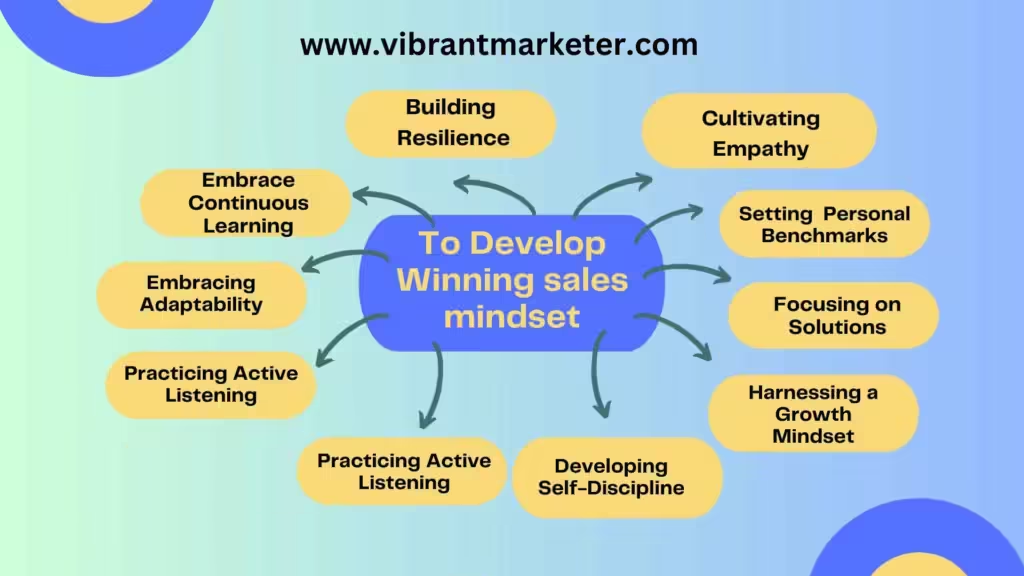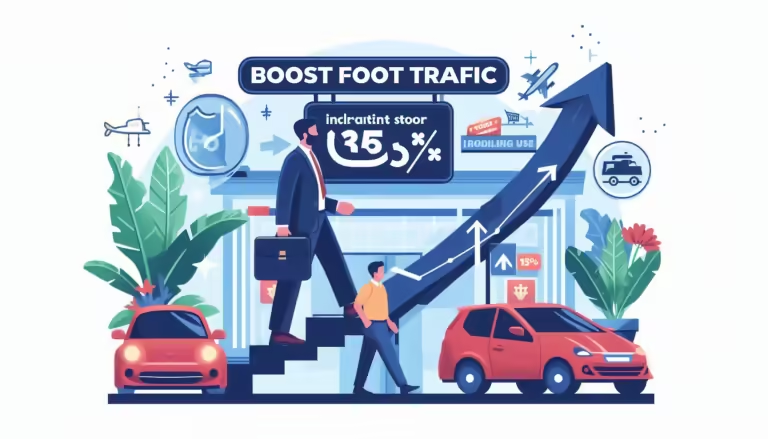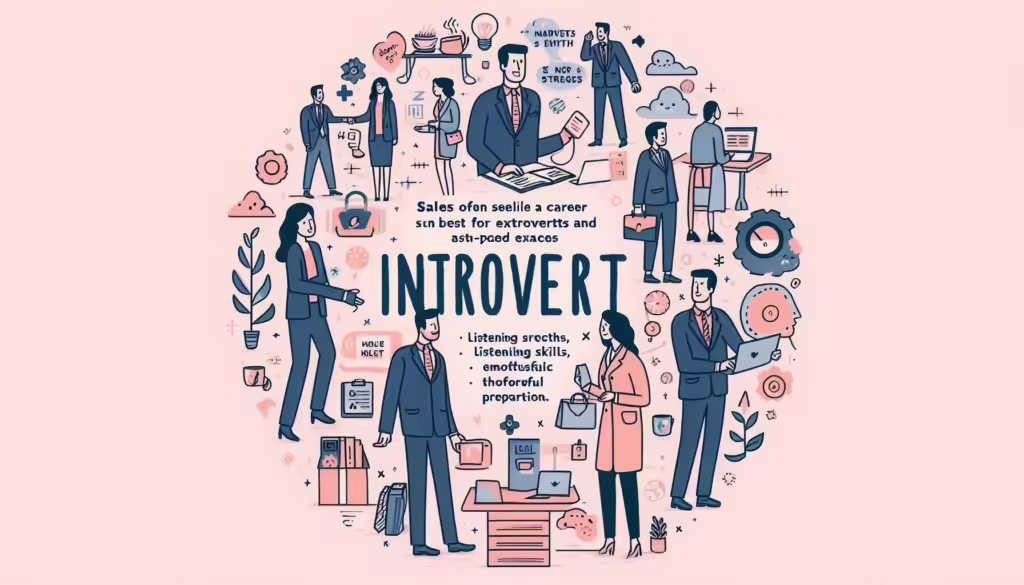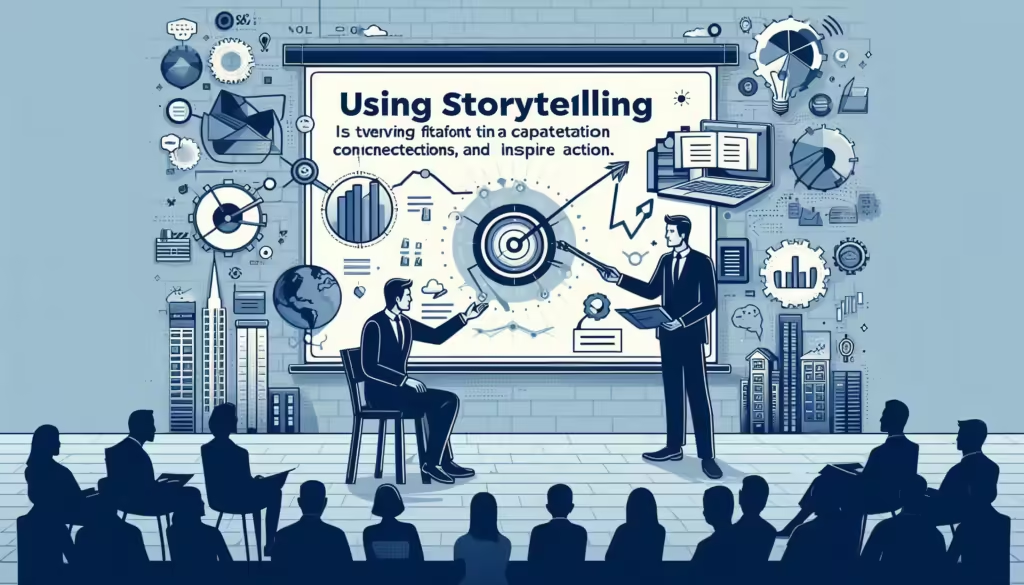How to Develop a Winning Sales Mindset (10 points)

Let’s dive into what it takes to build this mindset, with practical tips, examples, real-life case studies, and advice from renowned sales experts.
Understanding the Winning Sales Mindset
Example: Many top salespeople use daily affirmations like “I am capable of achieving my targets” to boost confidence. Studies show that positive affirmations can reduce stress by 32% and improve focus.
Importance

1. Embrace Continuous Learning
What it is: Continuous learning means actively seeking new skills, strategies, and knowledge to improve your sales abilities.
Why it’s important: Sales techniques, products, and markets are always evolving. To stay competitive, you need to keep learning and improving.
How to develop it:
- Read Sales Books & Articles – Books like “The Challenger Sale” by Brent Adamson and Matthew Dixon provide insights on how to challenge and guide customers.
- Attend Webinars & Courses – Sales webinars and courses help you learn from industry experts.
- Seek Mentorship – Learning from someone more experienced can accelerate your growth.
Expert Insight: Brian Tracy, a well-known sales trainer and author, says, “Sales is a skill you can learn and develop over time. The more you practice and learn, the better you become.” Tracy advocates for reading one sales book per month as part of his winning mindset approach.
2. Building Resilience
What it is: Resilience is the ability to bounce back after facing setbacks, such as losing a sale or dealing with rejection.
Why it’s important: Sales often involves rejection, but resilience allows you to recover quickly and keep going.
How to develop it:
- Shift Your Perspective – View rejection as a learning opportunity.
- Focus on Effort, Not Just Results – Measure success by your actions, not only the outcome.
- Practice Self-Care – Take breaks, exercise, and do activities that rejuvenate you.
Case Study: Sarah Blakely, founder of Spanx, built her company on resilience. Early on, she faced numerous rejections from investors. Instead of giving up, she used rejection to fuel her success and ultimately became one of the youngest self-made female billionaires. Her motto: “Fail big” encouraged her to take risks, knowing each failure was a step toward success.
3. Cultivating Empathy
What it is: Empathy is understanding and feeling what your customer feels, allowing you to connect with them on a personal level.
Why it’s important: People prefer to buy from those they feel understand them. Empathy helps build trust and long-lasting customer relationships.
How to develop it:
- Listen Actively – Pay attention to customer concerns without interrupting.
- Ask Open-Ended Questions – Questions like, “What are your biggest challenges?” help you understand the customer’s needs.
- Mirror Customer Language – Use words and expressions similar to those your customers use to make them feel comfortable.
Data Point: Studies show that 68% of customers are more likely to buy from a salesperson who shows empathy. Empathy also increases customer retention by up to 60%.
Expert Insight: “The best salespeople are listeners, not talkers,” says Zig Ziglar, a renowned sales expert. Listening and understanding what customers truly want can help you connect with them more effectively.
4. Setting and Reviewing Personal Benchmarks
What it is: Benchmarks are personal goals and standards that you set to measure your growth and progress.
Why it’s important: By setting clear benchmarks, you can track your improvement over time, which can boost your confidence and keep you focused.
How to develop it:
- Define Clear Metrics – For example, set a target to make 10 new customer calls daily.
- Review Weekly – Every week, assess how well you met your targets.
- Adjust as Needed – If you didn’t hit your goals, adjust your strategy instead of feeling discouraged.
Example: In the tech sales industry, top performers track metrics such as customer engagement rates, closed deals, and response times. This keeps them aware of where they need to improve.
5. Focusing on Solutions, Not Just Sales
What it is: Solution-focused selling is about addressing customer problems instead of just pushing a product.
Why it’s important: Today’s customers are more informed. They want to feel understood and see that a product is genuinely helpful.
How to develop it:
- Identify Customer Pain Points – Find out what problems your customer is facing.
- Show How Your Product Helps – Use specific examples to explain how your product solves these issues.
- Be Honest About Limitations – If your product doesn’t solve a problem, don’t force it. This honesty builds trust.
Example: Salesforce, a global leader in CRM software, uses solution-focused selling. Instead of just promoting their software, they help companies solve problems like managing customer data and improving team collaboration, which makes them a trusted partner in many industries.
6. Harnessing a Growth Mindset
What it is: A growth mindset is the belief that skills and abilities can be developed through hard work and dedication.
Why it’s important: Sales isn’t a one-time win; it’s a journey. A growth mindset helps you stay open to new experiences, see mistakes as learning opportunities, and keep improving.
How to develop it:
- Embrace Challenges – View difficult tasks as a chance to grow.
- Learn from Feedback – Ask for feedback from managers and customers to improve.
- Celebrate Small Wins – Recognize even minor successes to stay motivated.
Data Point: According to research from Carol Dweck, the psychologist who coined the term “growth mindset,” people with this mindset perform 50% better because they are less likely to give up and more likely to learn from setbacks.
Expert Insight: Gary Vaynerchuk, CEO of VaynerMedia, stresses the importance of a growth mindset in sales. He says, “Sales is about patience and hustle—improving every day, learning from mistakes, and doing it again.”
7. Developing Self-Discipline
What it is: Self-discipline is the ability to control your actions, focus on tasks, and resist distractions.
Why it’s important: Salespeople are often responsible for managing their own schedules and workload. Self-discipline ensures you stay productive and on target.
How to develop it:
- Set a Daily Routine – Start each day with a specific plan.
- Limit Distractions – Turn off notifications and set aside time for focused work.
- Reward Yourself – After completing tasks, give yourself a small reward.
Case Study: Elon Musk, CEO of Tesla and SpaceX, is known for his intense work ethic. By sticking to a strict daily schedule and focusing on high-priority tasks, he’s been able to lead his companies to enormous success. His discipline is a prime example of how self-management can lead to groundbreaking achievements.
8. Practicing Active Listening
What it is: Self-discipline is the ability to control your actions, focus on tasks, and resist distractions.
Why it’s important: Salespeople are often responsible for managing their own schedules and workload. Self-discipline ensures you stay productive and on target.
How to develop it:
- Set a Daily Routine – Start each day with a specific plan.
- Limit Distractions – Turn off notifications and set aside time for focused work.
- Reward Yourself – After completing tasks, give yourself a small reward.
Case Study: Elon Musk, CEO of Tesla and SpaceX, is known for his intense work ethic. By sticking to a strict daily schedule and focusing on high-priority tasks, he’s been able to lead his companies to enormous success. His discipline is a prime example of how self-management can lead to groundbreaking achievements.
9. Practicing Active Listening
What it is: Active listening means fully focusing, understanding, and responding to your customers without interrupting. It’s about giving them your full attention and showing that you genuinely care about what they have to say.
Why it’s important: Sales isn’t just about talking; it’s about understanding. When customers feel heard, they’re more likely to trust you, share their real concerns, and consider your solutions. Active listening also helps you understand the true needs and pain points of your customers, which can lead to a more tailored and effective sales approach.
How to develop it:
- Ask Clarifying Questions – If a customer says they need a solution that “saves time,” ask, “Can you tell me more about the challenges you’re facing with time management?” This helps you get specific information.
- Use Nonverbal Cues – Nodding, eye contact, and open body language show that you’re engaged.
- Summarize and Confirm – Repeat back what the customer has shared to make sure you’ve understood correctly
Example: In a famous study at the University of Minnesota, researchers found that sales reps who used active listening techniques increased their closing rate by up to 40%. This is because active listening builds trust, helps uncover hidden customer concerns, and leads to more meaningful conversations.
Expert Insight: Dale Carnegie, author of How to Win Friends and Influence People, said, “To be interesting, be interested.” Listening more than speaking can make customers feel valued and understood, creating a stronger connection.
10. Embracing Adaptability
What it is: Adaptability is the ability to adjust your approach based on different situations, customer needs, or unexpected changes. In sales, this means being flexible with your strategy, approach, or even product offerings.
Why it’s important: Sales environments can change rapidly, from shifts in customer preferences to new competitors or products. Being adaptable ensures that you can pivot when necessary, meet evolving customer expectations, and remain competitive.
How to develop it:
- Stay Informed About Industry Trends – Regularly read about your industry to understand shifts in customer behavior or new product trends.
- Experiment with New Approaches – Don’t hesitate to try new sales techniques or digital tools that can enhance your outreach.
- Seek Customer Feedback – Asking for feedback on what worked or didn’t during a sales call can help you adjust your approach.
Case Study: During the COVID-19 pandemic, many sales teams had to adapt quickly to remote selling. Zoom, a video conferencing software, adjusted its sales strategy to support the sudden demand from businesses, educational institutions, and individuals. By quickly shifting its approach, Zoom experienced rapid growth, proving that adaptability can be a game-changer.
Data Point: Research from McKinsey shows that companies with highly adaptable sales teams are 45% more likely to meet their sales targets. Adaptability makes it easier to respond to market changes and capture new opportunities.
Final Thoughts: How to Develop a Winning Sales Mindset
FAQs
A winning sales mindset is a positive way of thinking that helps you stay focused, confident, and motivated to achieve your sales goals.
A positive mindset helps you overcome challenges, stay motivated, and connect better with customers, which can lead to more sales.
Rejection is part of sales. Remind yourself that every “no” brings you closer to a “yes” and is a chance to learn and improve.
Setting goals, practicing gratitude, learning something new, and visualizing success each day can help boost a winning mindset.
Reflect on what happened, identify areas for improvement, and treat each mistake as a stepping stone for future success.
Resilience helps you bounce back from tough situations and stay focused on your goals without giving up.
Remind yourself of your goals, celebrate small wins, and think about the positive impact your product or service can have.
Yes, setting specific and realistic goals keeps you focused, motivated, and gives you a clear direction to work towards.
Empathy helps you understand what the customer needs, allowing you to build trust and offer the best solutions.
Share this post
















